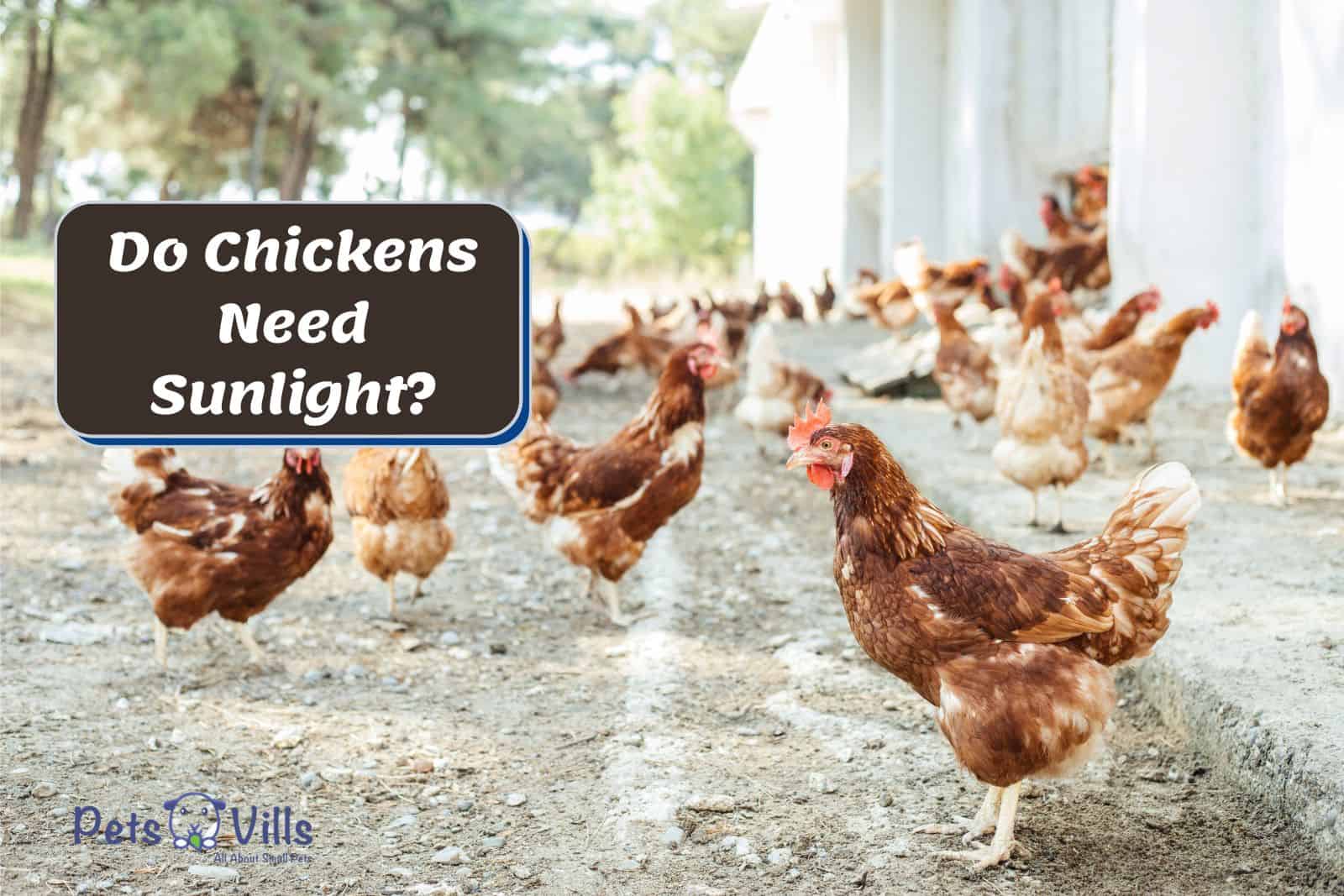Like any other animal, chickens have their own specific needs and requirements. Most people would assume access to sunlight is one of them.
So, do chickens need sunlight? According to experts, chickens need sunlight to survive, stay healthy, produce eggs, and maintain a regular sleep schedule (1).
However, there’s much more to know about chickens and sunlight.
But if you keep reading, I’ll cover everything to ensure your chickens can thrive!
Table of Contents
Key Takeaways
- Sunlight is necessary for chickens to survive, produce eggs, and stay healthy. It’s a valuable commodity to ensure these thrive and remain happy.
- Excessive sunlight can cause significant health risks like heatstroke. Owners must provide available shade areas to combat these issues. It becomes crucial during the summer months.
- Regular chickens only require 6-8 hours of direct sunlight per day. But hens need more, at least 12 hours, to help produce higher-quality eggs.
Do Chickens Need Sun Or Shade?
Sunlight and shade are essential parts of keeping your chickens healthy. It would be best if you found a way to balance them both to keep them strong.
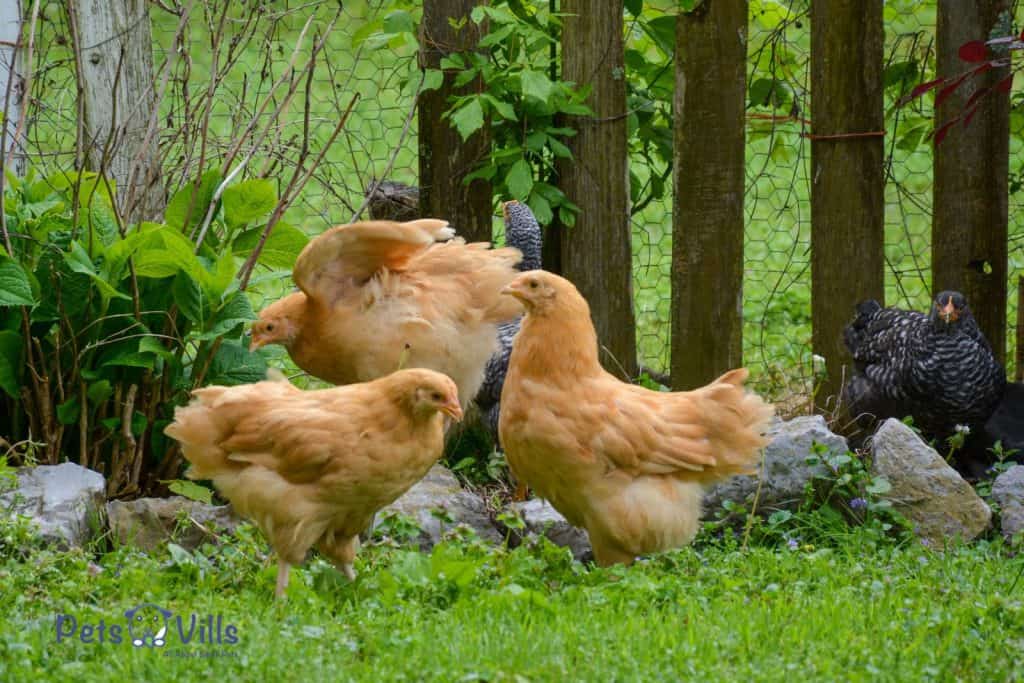
For instance, chickens are considered crepuscular birds. The term crepuscular refers to “twilight, the time shortly before sunrise and after sunset”(2).
In other words, chickens are known for being most active at dawn or in the evening. So these birds love the times of day when it’s not too hot or bright.
I can’t blame them considering I’m not too fond of overly hot or sunny days, either. I’d imagine it’s even worse with all those feathers.
But chickens can’t simply thrive being active only at these times. There isn’t enough sun to fulfill their daily sunlight needs to stay healthy.
After all, sunlight is an excellent source of vitamin D. It’ll provide your chickens with enough to meet their needs since they can’t produce their own vitamin D.
Sunlight is also necessary for hens to lay eggs. It also helps the chicken produce high-quality eggs, which isn’t possible with artificial lighting.
I’ve met several flock raisers who installed an artificial light. Unfortunately, the quality of eggs wasn’t up to par with what you get from traditional sunlight exposure.
As a result, it’s why free-range eggs taste way better. Those flocks have abundant sunlight exposure to ensure their eggs are top quality.
Meanwhile, shade becomes vital to help chickens deal with scorching temperatures. Your chickens will need a place to escape during those grueling summer months.
Shady areas will be their safe haven to survive and relax. In fact, their instincts will make them look for these places to protect themselves.
If you don’t provide them, the chickens could suffer from heatstroke (3). So do your best to create these areas if your flock needs access to them.
How Many Hours of Sunlight Do Chickens Need?
The sunlight needs will change depending on whether they’re laying eggs. Hens require 12 hours of light daily if they’re laying eggs.
In fact, your hens will only start laying eggs if this need is met. Their reproduction cycle is set in motion by natural light.
Basically, they’ll wait to lay eggs until the length of the day reaches 12 hours of daylight. So hens often will only lay eggs during the spring and summer months.
It’s the optimal time to get their sunlight requirements without issue. But it doesn’t mean hens won’t lay eggs in the colder months.
Instead, it’ll be much less frequent during fall and winter. Chicken keepers who want to increase egg production during these months often rely on artificial lights.
They’ll install these lights into the chicken coop to help meet sunlight requirements. Sadly, the egg quality isn’t top-tier, but it does allow hens to continue laying eggs.
As for chickens who aren’t laying eggs, their sunlight needs are a bit less. They only require 6 to 8 hours of sunlight daily.
It’s a much more manageable number to meet, especially when allowing chickens to roam free. You’ll often see them go out at the break of dawn and return when darkness falls.
Doing so allows them to hit their sunlight requirements without issue. It’s why I’ve always preferred letting them roam free over caging them.
Can a Chicken Coop Be In Direct Sunlight?
Experts usually advise against putting a chicken coop in direct sunlight. It’s easy to see why considering too much sun exposure causes heatstroke and other issues.
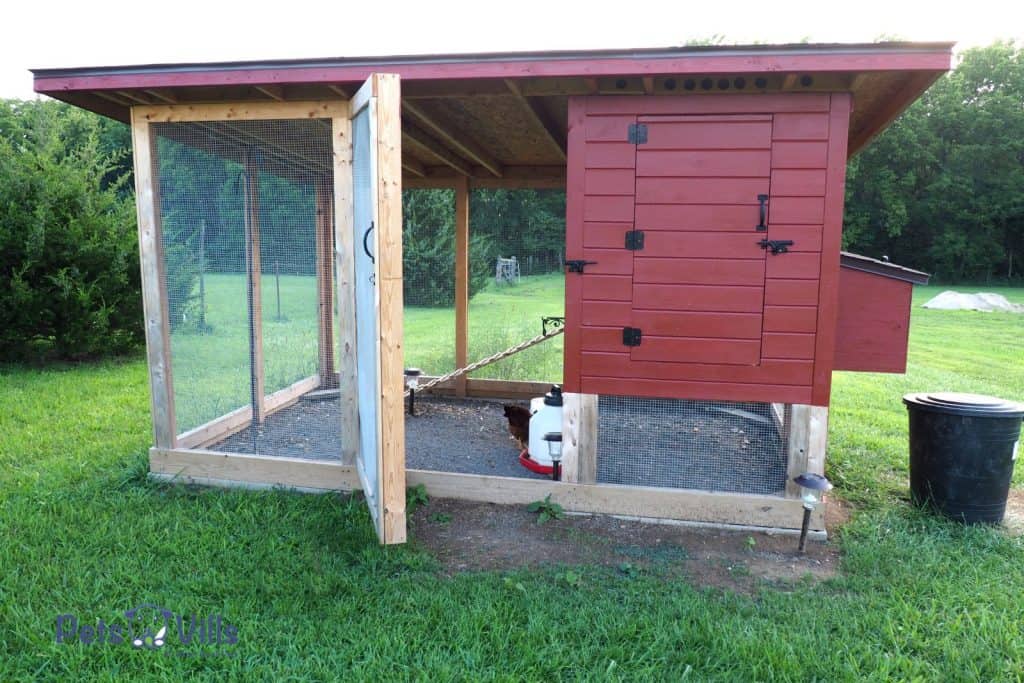
Therefore, placing a chicken coop in direct sunlight is a massive health risk. It can even kill your chickens, which isn’t what anyone wants for their flock.
This issue only becomes more problematic during the summer months. After all, most days will be overly hot and overwhelming to your flock.
So if you put their coop in direct sunlight, the temperature inside of it will soar. It’ll quickly reach an unacceptable level and become dangerous for your chickens.
Your chickens will even attempt to leave the coop under these circumstances. It’s a natural instinct to help prevent them from overheating.
However, if they’re trapped in this scorching coop area, it’ll kill them. So please, never place a coop in direct sunlight during these summer months.
But things do change when the temperatures start to drop. During the winter, a chicken coop can be in direct sunlight.
It’s often even encouraged to ensure your chicken can thrive in cold temperatures. For instance, the coop will absorb and keep the sunlight’s heat warm.
It can make their lives much more bearable in the winter if done correctly. It’s what I do with my flock when the weather gets frigid.
#1 How to Properly Direct Your Chicken Coop?
Multiple factors will determine what direction is optimal for your coop’s placement. But the main gist is pointing it in the direction that maximizes the breeze around your property.
Of course, this factor is much more vital when the temperature is hotter. So you ensure the coop’s placement maximizes the available breeze during the summer months.
Meanwhile, you’ll want to do the opposite when the temperature gets colder. You don’t want a cold breeze blowing into the coop and freezing your chickens.
So I imagine you’re wondering how you prepare for both situations. I’d start by utilizing windows in your coop to manage the breeze.
For instance, opening all these windows in the summer would be ideal. It’ll allow an easy way for them to cool off and be comfortable in the heat.
But it helps you combat it during the winter by closing whatever window is facing toward the oncoming breeze. Once you do, the breeze is no longer an issue.
Do Chickens Need Sunlight To Lay Eggs?
Sunlight is a necessity for egg production. For instance, your hen’s egg production routine is controlled by its pineal gland.
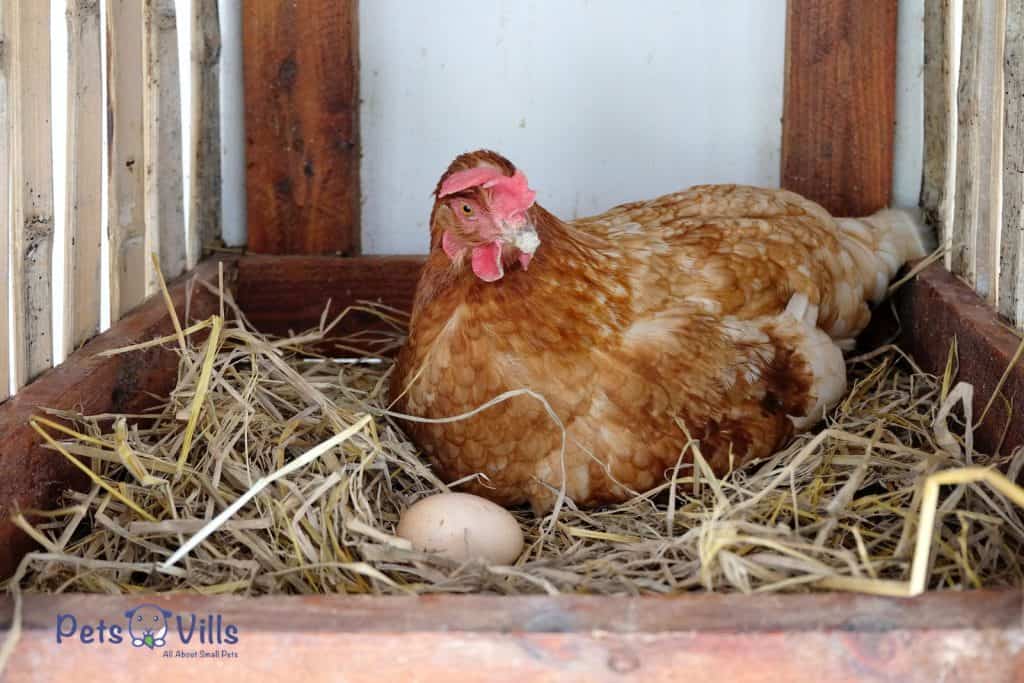
In other words, the pineal gland will determine when they lay their eggs. This gland is governed by the sun and activated when there’s a significant amount of sunlight.
Of course, the time of year will play a massive role in this process. It’ll determine how long and when the sun will shine.
So since the fall and winter months will provide less sunlight, your chicken’s pineal gland won’t activate as much. It’ll cause them to lay fewer eggs during these periods.
Meanwhile, the summer and fall months will produce much longer days. It’ll offer much more sunlight for your hens to use for egg production.
Therefore, their pineal gland will become activated much more frequently. It’ll then send a hormone to your hens’ ovaries to make them start laying eggs.
Can Chickens Be Kept In The Shade?
Chickens will need to be in the shade frequently to keep them healthy. In fact, it’s often where they have to be, especially when the temperature reaches dangerous levels.
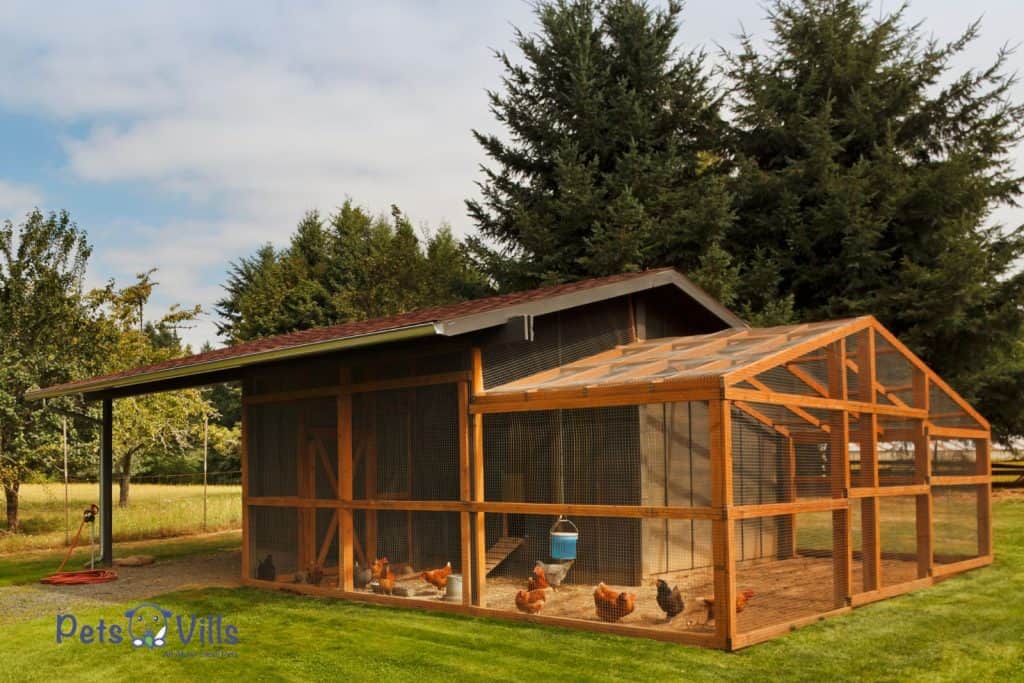
Your chickens will even seek out shade areas when roaming around freely. It’s the only way they know how to survive when they get too hot.
Doing so allows your chickens to self-regulate their body temperatures. They use the shade to cool down until they feel comfortable enough to return for foraging.
Given this info, backyard chicken keepers with free-roam setups must offer plenty of shade areas. It’s a crucial piece to running a successful operation.
Otherwise, the direct sunlight will cause serious health risks for your chickens. So please, think about where your chickens will get their shady before using a free-roam setup.
Expand your knowledge of poultry behavior by exploring our insightful article “Do Chickens Eat Their Own Eggs?” – a must-read for understanding and managing your flock’s dietary habits.
FAQs
#1 Can chickens lay eggs without sunlight?
Chickens can’t lay eggs without a sufficient amount of sunlight. The hormonal response necessary for egg production won’t activate if it’s not provided. So sunlight becomes an essential component of this entire process.
#2 How do chickens get Vitamin D?

Chickens get their vitamin D through external sources like sunlight and food. Sadly, they can’t produce it themselves as some animals do. Therefore, a chicken owner will need to get it from other means.
#3 Do chickens like a light on at night?
Your chickens won’t like a light on at night. In fact, leaving a bright light on at night can cause health issues and behavioral problems. So owners are better off keeping chicken coops dark during sleeping hours.
Conclusion
So do chickens need sunlight? Like most animals, sunlight is vital to keeping your chickens happy/healthy. It’ll also help hens produce better eggs while assisting them to thrive.
But there must be a balance because too much sunlight causes health issues. Therefore, offering them equal shade throughout the day is vital.
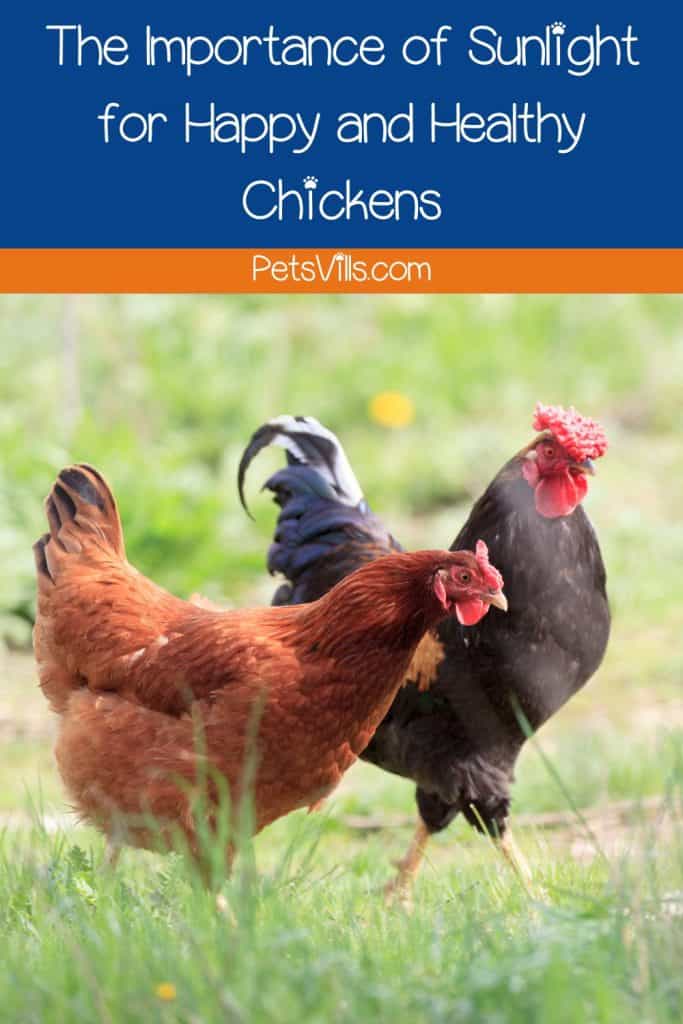
Resources
1. Decreasing daylight and its effect on laying hens [Internet]. Poultry. Available from: https://www.canr.msu.edu/news/decreasing-daylight-and-its-effect-on-laying-hens
2. Carlson NV. Crepuscular. Encyclopedia of Animal Cognition and Behavior. 2017;1–4.
3. Preventing heat stress in poultry [Internet]. extension.umn.edu. Available from: https://extension.umn.edu/poultry-care-and-management/preventing-heat-stress-poultry
Alina Hartley is a small-town girl with a ginormous love of bearded dragons. It all started with Winchester, a baby bearded who was abandoned at the shelter by his former owners because of a birth defect that caused one front leg to be shorter than the other. Alina originally went to the shelter looking for a guinea pig, but one look at Winchester and it was love at first sight. From that day on, Alina has dedicated her life to learning everything she can about bearded dragons. She loves helping new beardie parents start their incredible journey with these magnificent reptiles.
Follow her on:
LINKEDIN
TWITTER.
Read her latest articles HERE
Learn more about her HERE.

